Unit 2 Great People Lesson 11 To China, with Love 课件(共32张PPT)
文档属性
| 名称 | Unit 2 Great People Lesson 11 To China, with Love 课件(共32张PPT) |
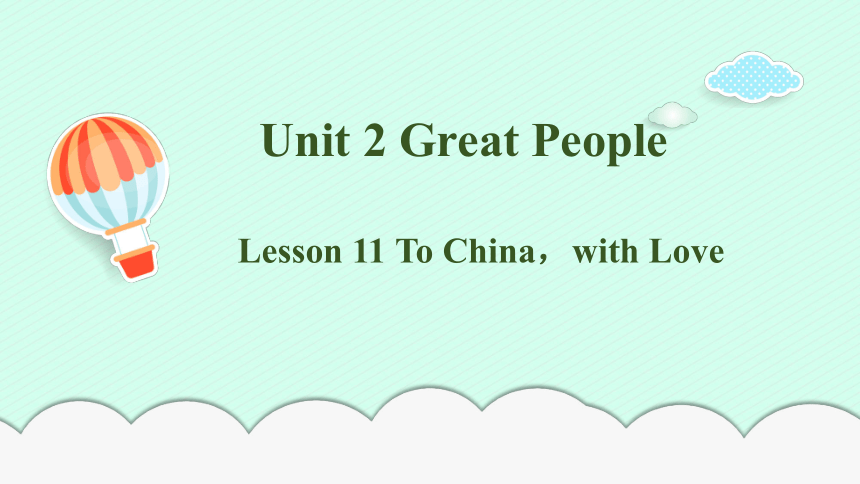
|
|
| 格式 | zip | ||
| 文件大小 | 16.2MB | ||
| 资源类型 | 教案 | ||
| 版本资源 | 冀教版 | ||
| 科目 | 英语 | ||
| 更新时间 | 2021-09-19 11:36:46 | ||
图片预览

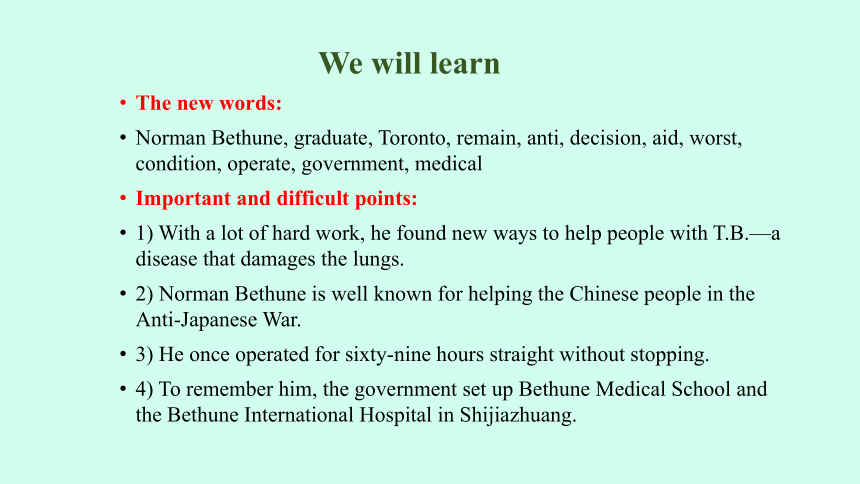
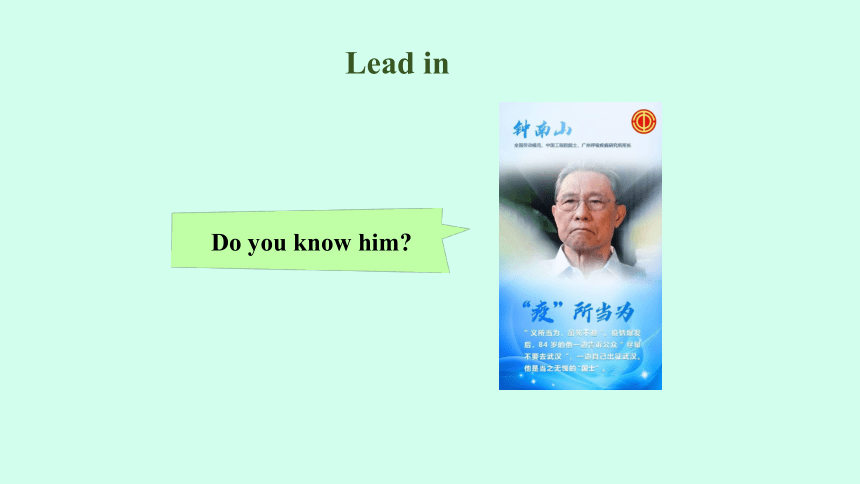
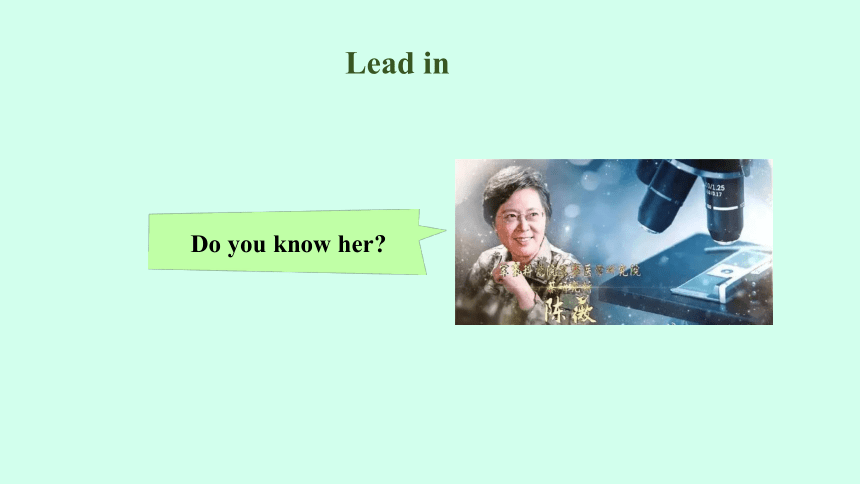
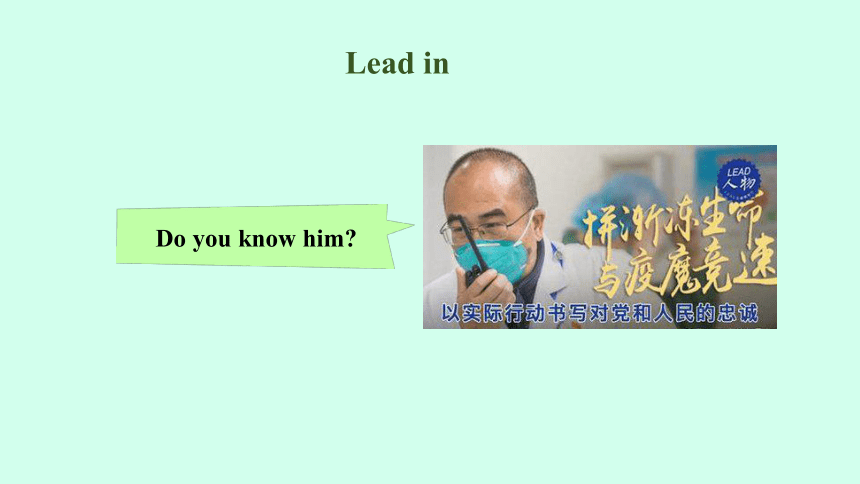
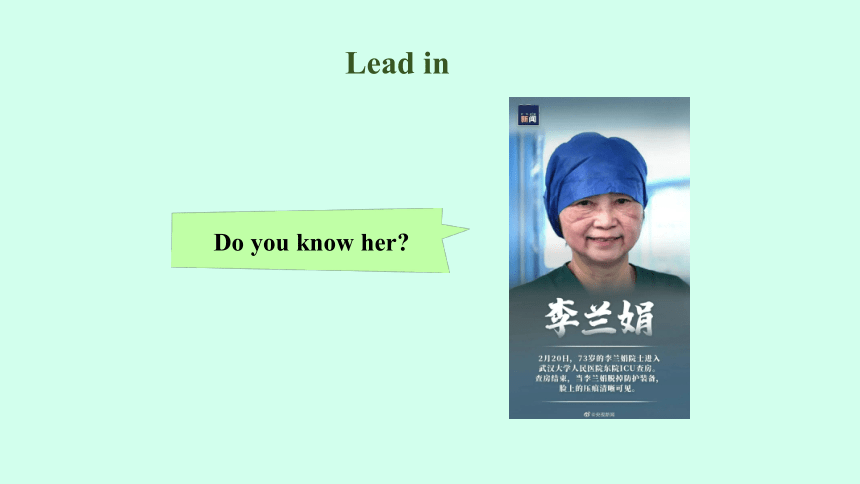

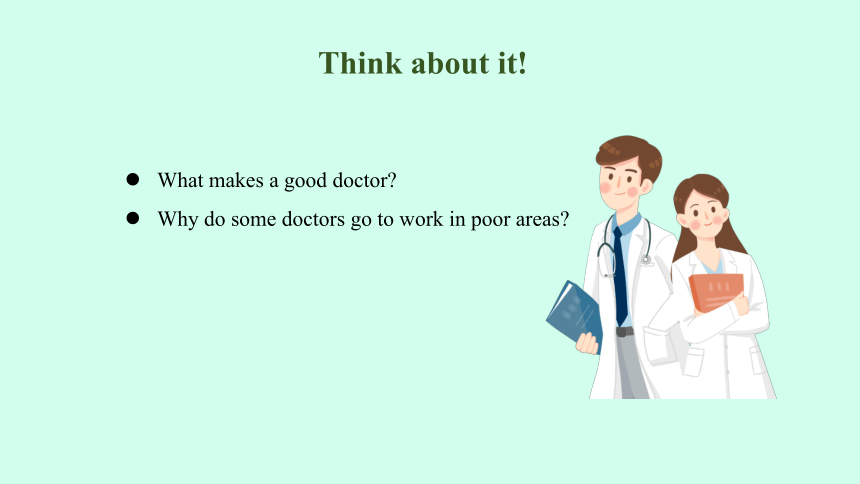
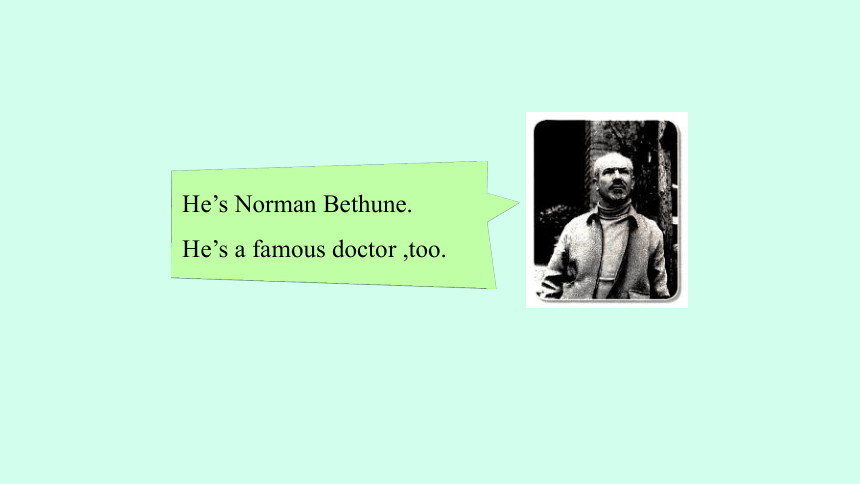
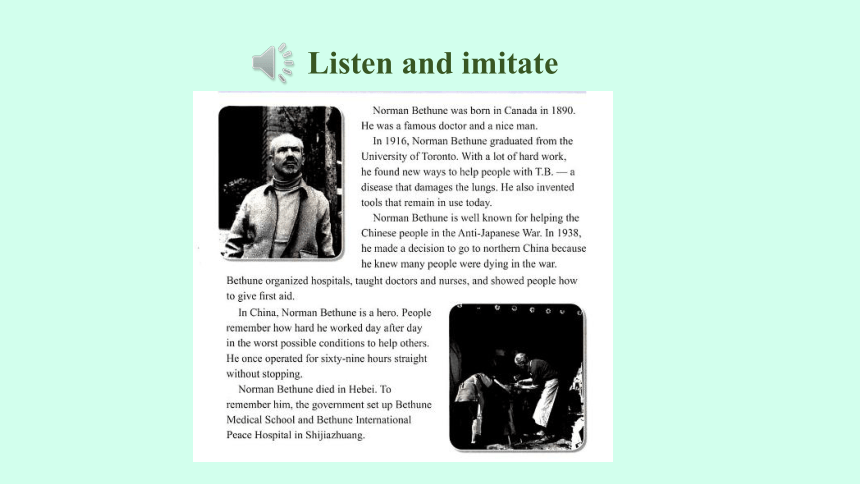
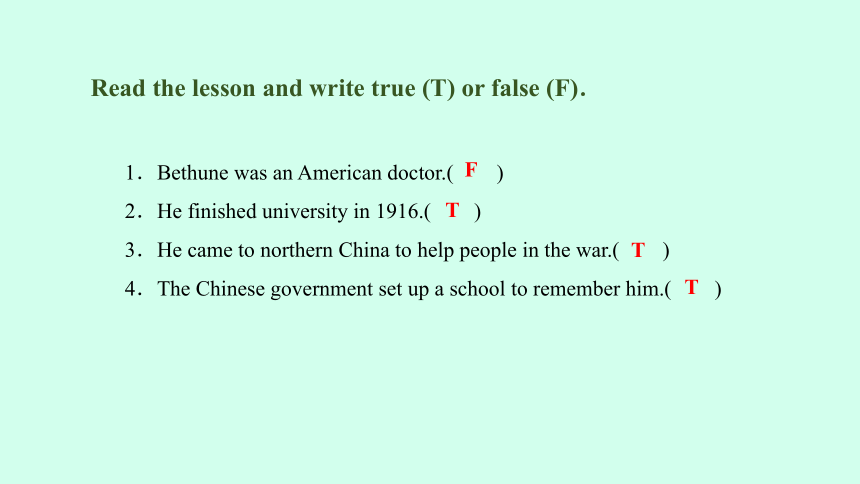

文档简介
(共32张PPT)
Unit
2
Great
People
Lesson
11
To
China,with
Love
We
will
learn
The
new
words:
Norman
Bethune,
graduate,
Toronto,
remain,
anti,
decision,
aid,
worst,
condition,
operate,
government,
medical
Important
and
difficult
points:
1)
With
a
lot
of
hard
work,
he
found
new
ways
to
help
people
with
T.B.—a
disease
that
damages
the
lungs.
2)
Norman
Bethune
is
well
known
for
helping
the
Chinese
people
in
the
Anti-Japanese
War.
3)
He
once
operated
for
sixty-nine
hours
straight
without
stopping.
4)
To
remember
him,
the
government
set
up
Bethune
Medical
School
and
the
Bethune
International
Hospital
in
Shijiazhuang.
Lead
in
Do
you
know
him?
Lead
in
Do
you
know
her?
Lead
in
Do
you
know
him?
Lead
in
Do
you
know
her?
Lead
in
Are
they
good
doctors?
Why
Think
about
it!
What
makes
a
good
doctor?
Why
do
some
doctors
go
to
work
in
poor
areas?
He’s
Norman
Bethune.
He’s
a
famous
doctor
,too.
Listen
and
imitate
Read
the
lesson
and
write
true
(T)
or
false
(F).
1.Bethune
was
an
American
doctor.( )
2.He
finished
university
in
1916.( )
3.He
came
to
northern
China
to
help
people
in
the
war.( )
4.The
Chinese
government
set
up
a
school
to
remember
him.( )
F
T
T
T
What
did
Bethune
do?
Read
the
lesson
and
complete
the
list.
·He
found
new
ways
to__________________________.
·He
invented__________________________________.
·He____________________________________________
_____________________________________.
·He_________________________________________.
·He____________________________________________
__________________________________.
·He
once______________________________________
__________________________________________.
help
people
with
T.B
tools
that
remain
in
use
today
is
well?known
for
helping
the
Chinese
people
in
the
Anti?Japanese
War
made
a
decision
to
go
to
northern
China
organized
hospitals,
taught
doctors
and
nurses,
and
showed
people
how
to
give
first
aid
operated
for
sixty?nine
hours
straight
without
stopping
1.graduate
from
毕业于……
e.g.
She
graduated
from
high
school
two
years
ago.
她两年前高中毕业。
graduation
n.毕业,毕业典礼
e.g.
It
was
his
first
job
after
graduation.
这是他毕业后第一份工作。
graduate
in+所学的专业
e.g.
I
graduated
in
English.我毕业于英语专业。
Language
points
Language
points
2.
With
a
lot
of
hard
work,
he
found
new
ways
to
help
people
with
T.B.—a
disease
that
damages
the
lungs.
经过很多艰苦的工作,他找到了帮助人们治疗伤害人肺部的肺结核的方法。
句中的to
help
people
with
T.B.—a
disease
that
damages
the
lungs是动词不定式短语用在名词way后作定语。不定式有时起形容词作用修饰名词或代词,在句中作定语。不定式作定语时,它的位置在它所修饰的名词或代词之后。
e.g.
①Is
there
anyone
to
look
after
these
children?
有人照看这些孩子吗?
②Are
there
many
places
to
see
in
Washington?
在华盛顿有许多可看的地方吗?
Language
points
【拓展】如果不定式是不及物动词,或者不定式所修饰的名词或代词是不定式动作的地点、工具等,不定式后面应加上介词或副词。
e.g.
①They
have
a
lot
of
things
to
talk
about.
他们有很多事情要谈。
②Are
there
many
places
to
see
in
Washington?
在华盛顿有许多可看的地方吗?
③There
is
nothing
to
worry
about.没有什么可担心的。
3.remain
/r?'me?n/
v.
仍然是;保持不变
e.g.
It
remained
a
secret.
它仍然是个秘密。
remain
用作连系动词,意为“仍然;依旧”,其用法为:
①remain后接名词作表语。
e.g.
In
spite
of
their
quarrels,they
remained
the
best
friends.
尽管吵过架,他们仍然是最好的朋友。
Language
points
②remain后接形容词作表语。
e.g.
He
remained
silent.
他保持沉默。
③remain后接介词短语作表语。
e.g.
He
had
to
remain
in
hospital
until
he
was
better.
他不得不一直住院直到他身体好些。
④remain后接分词作表语。接现在分词作表语,表
示正在进行的主动动作;接过去分词作表语,
表示主语所处的状态或已经发生的被动动作。
e.g.
The
situation
remained
unchanged.
局势依然未变。
Language
points
remain作不及物动词的用法:
表示“剩余”“残存”。
e.g.
After
the
big
fire,very
little
remained
in
my
house.
大火之后,我家里的东西所剩无几。
表示“逗留”,“留下”。
e.g.
How
many
days
will
you
remain
here?
你将在此地逗留多少天?
Language
points
4.decision
/d?'s??n/
n.决定
e.g.
I
don't
think
his
decision
is
wise.
我觉得他的决定并不明智。
decision后面可接不定式,而不接of
doing。
e.g.
My
decision
to
go
there
hangs
on
your
answer.
我要看你的回答才能决定去不去那儿。
Language
points
作出决定
come
to
a
decision
make
a
decision
reach
a
decision
arrive
at
a
decision
e.g.
I
was
unable
to
make
a
decision.
我不能作出决定。
Language
points
decision
的动词形式为decide,常用结构:
(1)decide
to
do
sth.“决定做某事”。
e.g.
He
decided
to
give
a
one-man
show.
他决定来一段单人表演。
(2)decide
+
疑问词+
动词不定式,
表示“决定……”。
e.g.
I
can't
decide
which
one
to
buy.
我拿不定主意买哪件。
Language
points
(3)decide
about/
on
+
名词/
代词/
动名词,表示“决定……”。
e.g.
I
decide
on
a
book
that
I
need
to
read.
我选定了一本我需要看的书。
(4)decide+从句
e.g.
I
decide
I
read
English
for
an
hour
every
day.
我决定每天读一小时英语。
Language
points
Language
points
2.
He
once
operated
for
sixty-nine
hours
straight
without
stopping.
他曾经没有停下来而连续作了69个小时的手术。
句中的without
stopping
是介词短语作状语,修饰前面的动词operate。介词without后加名词、代词、动名词构成介词短语作状语后可作状语,意为“没有……”。
e.g.
She
went
to
school
without
having
breakfast.
她没吃早饭就去上学了。
Language
points
3.
To
remember
him,
the
government
set
up
Bethune
Medical
School
and
the
Bethune
International
Hospital
in
Shijiazhuang.
为了记住他,政府在石家庄建了白求恩医学院和白求恩国际医院。
句中的to
remember
him是动词不定式短语用在句首作状语,表示目的。不定式作状语还可直接用在动词后。
e.g.
①Emma
came
to
see
me
yesterday
morning.
埃玛昨天上午来看我了。
②To
learn
English
well,
she
went
to
in
England.
为了学好英语,她去了英国。
set
up
成立,
建立,
开办,
竖起,
安装,
安排
set
up
表示“成立,建立,开办”时与found,
build
的辨析
Language
points
build建造,修建,后跟具体的建筑,如房屋等。
The
workers
built
a
new
house
in
our
school.
工人们在我们学校建起了一座新房子。
found建立,创立,后多跟国家,党派,团体等名词。
The
Chinese
Communist
Party
was
founded
in
1921.
中国共产党是在1921年成立的。
set
up搭起,建起,后多跟简易的建筑物,机构,设施等名词。
I
want
to
set
up
a
fund
to
help
the
poor.我想成立一个基金会去帮助那些穷人。
3)Fill
in
the
blanks
with
the
words
or
phrases
in
the
box.
1.He
made
a
________
to
accept
the
challenging
task.
2.The
volunteers
______
an
organization
to
protect
the
environment.
3.Teenagers
should
have
some
knowledge
about
_______.
4.They
live
far
away
from
each
other,
but
they
________
close
friends.
5.This
plant
can
grow
in
the
worst
________.
It's
amazing!
remain
decision
set
up
first
aid
remain decision condition first
aid set
up
condition
Let’s
Do
It
!
4)Let’s
do
a
quick
quiz!
1.Who
wrote
The
Story
of
My
Life,
a
book
that
is
translated
into
fifty
languages?
2.Who
was
chosen
as
a
great
man
of
the
century
by
The
Times?
3.Who
was
the
first
on
the
list
of
rich-in-soul
people
in
China
in
2010?
4.What
was
the
cause
of
Bethune's
death?
Now,
try
to
find
more
facts
about
great
people.
Helen
Keller.
Albert
Einstein.
Let’s
Do
It
!
Yuan
Longping.
Blood
Poisoning.
一、单项选择。
(
)1.
Did
you
operate
_______
that
patient?
A.
on
B.
with
C.
in
D.
to
(
)2.
The
poor
boy
died
_______
terrible
illness.
A.
in
B.
by
C.
of
D.
with
(
)3.
Tom
didn’t
go
to
school
yesterday
______
he
was
ill
.
A.
as
B.
so
C.
because
D.
while
(
)4.
Andy
often
helps
her
mother
______
the
housework
on
Sunday
afternoon.
A.
to
B.
of
C.
for
D.
with
Exercises
?
A
C
C
D
二、连词成句(每小题均有一处词形变化)
1.hero,
they,
become,
my
____________________________________________.
2.showed,
invent,
he,
an,
me
____________________________________________.
3.be,
in
a
city,
my,
born,
friend
____________________________________________.
4.help,
my,
with,
Tom,
English,
me
____________________________________________.
5.you,
one,
can,
people,
aid,
give
____________________________________________?
Exercises
They
become
my
heroes
He
showed
me
an
invention
My
friend
was
born
in
a
city
Tom
helps
me
with
my
English
Can
you
give
people
first
aid
Summary
Words:
remain,
decision
Phrases:
graduate
from,
set
up
Sentences:
)
With
a
lot
of
hard
work,
he
found
new
ways
to
help
people
with
T.B.—a
disease
that
damages
the
lungs.
2)
Norman
Bethune
is
well
known
for
helping
the
Chinese
people
in
the
Anti-Japanese
War.
3)
He
once
operated
for
sixty-nine
hours
straight
without
stopping.
4)
To
remember
him,
the
government
set
up
Bethune
Medical
School
and
the
Bethune
International
Hospital
in
Shijiazhuang.
Homework
1.Write
a
passage
about
Zhong
Nanshan.
2.Preview
Unit
2-Lesson
12.
Bye-bye!
Unit
2
Great
People
Lesson
11
To
China,with
Love
We
will
learn
The
new
words:
Norman
Bethune,
graduate,
Toronto,
remain,
anti,
decision,
aid,
worst,
condition,
operate,
government,
medical
Important
and
difficult
points:
1)
With
a
lot
of
hard
work,
he
found
new
ways
to
help
people
with
T.B.—a
disease
that
damages
the
lungs.
2)
Norman
Bethune
is
well
known
for
helping
the
Chinese
people
in
the
Anti-Japanese
War.
3)
He
once
operated
for
sixty-nine
hours
straight
without
stopping.
4)
To
remember
him,
the
government
set
up
Bethune
Medical
School
and
the
Bethune
International
Hospital
in
Shijiazhuang.
Lead
in
Do
you
know
him?
Lead
in
Do
you
know
her?
Lead
in
Do
you
know
him?
Lead
in
Do
you
know
her?
Lead
in
Are
they
good
doctors?
Why
Think
about
it!
What
makes
a
good
doctor?
Why
do
some
doctors
go
to
work
in
poor
areas?
He’s
Norman
Bethune.
He’s
a
famous
doctor
,too.
Listen
and
imitate
Read
the
lesson
and
write
true
(T)
or
false
(F).
1.Bethune
was
an
American
doctor.( )
2.He
finished
university
in
1916.( )
3.He
came
to
northern
China
to
help
people
in
the
war.( )
4.The
Chinese
government
set
up
a
school
to
remember
him.( )
F
T
T
T
What
did
Bethune
do?
Read
the
lesson
and
complete
the
list.
·He
found
new
ways
to__________________________.
·He
invented__________________________________.
·He____________________________________________
_____________________________________.
·He_________________________________________.
·He____________________________________________
__________________________________.
·He
once______________________________________
__________________________________________.
help
people
with
T.B
tools
that
remain
in
use
today
is
well?known
for
helping
the
Chinese
people
in
the
Anti?Japanese
War
made
a
decision
to
go
to
northern
China
organized
hospitals,
taught
doctors
and
nurses,
and
showed
people
how
to
give
first
aid
operated
for
sixty?nine
hours
straight
without
stopping
1.graduate
from
毕业于……
e.g.
She
graduated
from
high
school
two
years
ago.
她两年前高中毕业。
graduation
n.毕业,毕业典礼
e.g.
It
was
his
first
job
after
graduation.
这是他毕业后第一份工作。
graduate
in+所学的专业
e.g.
I
graduated
in
English.我毕业于英语专业。
Language
points
Language
points
2.
With
a
lot
of
hard
work,
he
found
new
ways
to
help
people
with
T.B.—a
disease
that
damages
the
lungs.
经过很多艰苦的工作,他找到了帮助人们治疗伤害人肺部的肺结核的方法。
句中的to
help
people
with
T.B.—a
disease
that
damages
the
lungs是动词不定式短语用在名词way后作定语。不定式有时起形容词作用修饰名词或代词,在句中作定语。不定式作定语时,它的位置在它所修饰的名词或代词之后。
e.g.
①Is
there
anyone
to
look
after
these
children?
有人照看这些孩子吗?
②Are
there
many
places
to
see
in
Washington?
在华盛顿有许多可看的地方吗?
Language
points
【拓展】如果不定式是不及物动词,或者不定式所修饰的名词或代词是不定式动作的地点、工具等,不定式后面应加上介词或副词。
e.g.
①They
have
a
lot
of
things
to
talk
about.
他们有很多事情要谈。
②Are
there
many
places
to
see
in
Washington?
在华盛顿有许多可看的地方吗?
③There
is
nothing
to
worry
about.没有什么可担心的。
3.remain
/r?'me?n/
v.
仍然是;保持不变
e.g.
It
remained
a
secret.
它仍然是个秘密。
remain
用作连系动词,意为“仍然;依旧”,其用法为:
①remain后接名词作表语。
e.g.
In
spite
of
their
quarrels,they
remained
the
best
friends.
尽管吵过架,他们仍然是最好的朋友。
Language
points
②remain后接形容词作表语。
e.g.
He
remained
silent.
他保持沉默。
③remain后接介词短语作表语。
e.g.
He
had
to
remain
in
hospital
until
he
was
better.
他不得不一直住院直到他身体好些。
④remain后接分词作表语。接现在分词作表语,表
示正在进行的主动动作;接过去分词作表语,
表示主语所处的状态或已经发生的被动动作。
e.g.
The
situation
remained
unchanged.
局势依然未变。
Language
points
remain作不及物动词的用法:
表示“剩余”“残存”。
e.g.
After
the
big
fire,very
little
remained
in
my
house.
大火之后,我家里的东西所剩无几。
表示“逗留”,“留下”。
e.g.
How
many
days
will
you
remain
here?
你将在此地逗留多少天?
Language
points
4.decision
/d?'s??n/
n.决定
e.g.
I
don't
think
his
decision
is
wise.
我觉得他的决定并不明智。
decision后面可接不定式,而不接of
doing。
e.g.
My
decision
to
go
there
hangs
on
your
answer.
我要看你的回答才能决定去不去那儿。
Language
points
作出决定
come
to
a
decision
make
a
decision
reach
a
decision
arrive
at
a
decision
e.g.
I
was
unable
to
make
a
decision.
我不能作出决定。
Language
points
decision
的动词形式为decide,常用结构:
(1)decide
to
do
sth.“决定做某事”。
e.g.
He
decided
to
give
a
one-man
show.
他决定来一段单人表演。
(2)decide
+
疑问词+
动词不定式,
表示“决定……”。
e.g.
I
can't
decide
which
one
to
buy.
我拿不定主意买哪件。
Language
points
(3)decide
about/
on
+
名词/
代词/
动名词,表示“决定……”。
e.g.
I
decide
on
a
book
that
I
need
to
read.
我选定了一本我需要看的书。
(4)decide+从句
e.g.
I
decide
I
read
English
for
an
hour
every
day.
我决定每天读一小时英语。
Language
points
Language
points
2.
He
once
operated
for
sixty-nine
hours
straight
without
stopping.
他曾经没有停下来而连续作了69个小时的手术。
句中的without
stopping
是介词短语作状语,修饰前面的动词operate。介词without后加名词、代词、动名词构成介词短语作状语后可作状语,意为“没有……”。
e.g.
She
went
to
school
without
having
breakfast.
她没吃早饭就去上学了。
Language
points
3.
To
remember
him,
the
government
set
up
Bethune
Medical
School
and
the
Bethune
International
Hospital
in
Shijiazhuang.
为了记住他,政府在石家庄建了白求恩医学院和白求恩国际医院。
句中的to
remember
him是动词不定式短语用在句首作状语,表示目的。不定式作状语还可直接用在动词后。
e.g.
①Emma
came
to
see
me
yesterday
morning.
埃玛昨天上午来看我了。
②To
learn
English
well,
she
went
to
in
England.
为了学好英语,她去了英国。
set
up
成立,
建立,
开办,
竖起,
安装,
安排
set
up
表示“成立,建立,开办”时与found,
build
的辨析
Language
points
build建造,修建,后跟具体的建筑,如房屋等。
The
workers
built
a
new
house
in
our
school.
工人们在我们学校建起了一座新房子。
found建立,创立,后多跟国家,党派,团体等名词。
The
Chinese
Communist
Party
was
founded
in
1921.
中国共产党是在1921年成立的。
set
up搭起,建起,后多跟简易的建筑物,机构,设施等名词。
I
want
to
set
up
a
fund
to
help
the
poor.我想成立一个基金会去帮助那些穷人。
3)Fill
in
the
blanks
with
the
words
or
phrases
in
the
box.
1.He
made
a
________
to
accept
the
challenging
task.
2.The
volunteers
______
an
organization
to
protect
the
environment.
3.Teenagers
should
have
some
knowledge
about
_______.
4.They
live
far
away
from
each
other,
but
they
________
close
friends.
5.This
plant
can
grow
in
the
worst
________.
It's
amazing!
remain
decision
set
up
first
aid
remain decision condition first
aid set
up
condition
Let’s
Do
It
!
4)Let’s
do
a
quick
quiz!
1.Who
wrote
The
Story
of
My
Life,
a
book
that
is
translated
into
fifty
languages?
2.Who
was
chosen
as
a
great
man
of
the
century
by
The
Times?
3.Who
was
the
first
on
the
list
of
rich-in-soul
people
in
China
in
2010?
4.What
was
the
cause
of
Bethune's
death?
Now,
try
to
find
more
facts
about
great
people.
Helen
Keller.
Albert
Einstein.
Let’s
Do
It
!
Yuan
Longping.
Blood
Poisoning.
一、单项选择。
(
)1.
Did
you
operate
_______
that
patient?
A.
on
B.
with
C.
in
D.
to
(
)2.
The
poor
boy
died
_______
terrible
illness.
A.
in
B.
by
C.
of
D.
with
(
)3.
Tom
didn’t
go
to
school
yesterday
______
he
was
ill
.
A.
as
B.
so
C.
because
D.
while
(
)4.
Andy
often
helps
her
mother
______
the
housework
on
Sunday
afternoon.
A.
to
B.
of
C.
for
D.
with
Exercises
?
A
C
C
D
二、连词成句(每小题均有一处词形变化)
1.hero,
they,
become,
my
____________________________________________.
2.showed,
invent,
he,
an,
me
____________________________________________.
3.be,
in
a
city,
my,
born,
friend
____________________________________________.
4.help,
my,
with,
Tom,
English,
me
____________________________________________.
5.you,
one,
can,
people,
aid,
give
____________________________________________?
Exercises
They
become
my
heroes
He
showed
me
an
invention
My
friend
was
born
in
a
city
Tom
helps
me
with
my
English
Can
you
give
people
first
aid
Summary
Words:
remain,
decision
Phrases:
graduate
from,
set
up
Sentences:
)
With
a
lot
of
hard
work,
he
found
new
ways
to
help
people
with
T.B.—a
disease
that
damages
the
lungs.
2)
Norman
Bethune
is
well
known
for
helping
the
Chinese
people
in
the
Anti-Japanese
War.
3)
He
once
operated
for
sixty-nine
hours
straight
without
stopping.
4)
To
remember
him,
the
government
set
up
Bethune
Medical
School
and
the
Bethune
International
Hospital
in
Shijiazhuang.
Homework
1.Write
a
passage
about
Zhong
Nanshan.
2.Preview
Unit
2-Lesson
12.
Bye-bye!
同课章节目录
- Unit 1 Stay Healthy
- Lesson 1 What's Wrong,Danny?
- Lesson 2 A Visit to the Dentist
- Lesson 3 Good Food, Good Health
- Lesson 4 Don't Smoke, Please!
- Lesson 5 Jane's Lucky Life
- Lesson 6 Stay Away from the Hospital
- Unit Review
- Unit 2 Great People
- Lesson 7 What Is the Meaning of Lift?
- Lesson 8 A Universe of Thought
- Lesson 9 China's Most Famous "Farmer"
- Lesson 10 Touch the World
- Lesson 11 To China, with Love
- Lesson 12 Guess My Hero!
- Unit Review
- Unit 3 Safety
- Lesson 13 Be Careful,Danny!
- Lesson 14 Accidents Happen
- Lesson 15 My Helmet Saved My Life!
- Lesson 16 How Safe Is Your Home?
- Lesson 17 Staying Safe in an Earthquake
- Lesson 18 Never Catch a Dinosaur
- Unit Review
- Unit 4 Stories and poems
- Lesson 19 A Story or a Poem?
- Lesson 20 Say It in Five
- Lesson 21 The Fable of the Woodcutte
- Lesson 22 The Giant(Ⅰ)
- Lesson 23 The Giant(Ⅱ)
- Lesson 24 Writing a Poem
- Unit Review
- Unit 5 Look into Science
- Lesson 25 Let's Do an Experiment!
- Lesson 26 Keep the Candle Burning
- Lesson 27 Planet Danny
- Lesson 28 The Study of Living Things
- Lesson 29 DNA—The Story of You
- Lesson 30 Science Affects Us
- Unit Review
- Unit 6 Movies and Theate
- Lesson 31 A movie or a Play
- Lesson 32 Moving Pictures
- Lesson 33 The Fisherman and the Goldfish(Ⅰ)
- Lesson 34 The Fisherman and the Goldfish(Ⅱ)
- Lesson 35 Theatres Are Fun!
- Lesson 36 Making Plays Is Fun
- Unit Review
